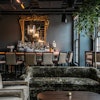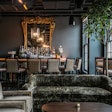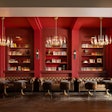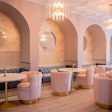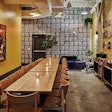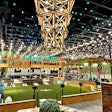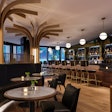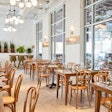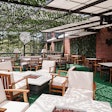
By Ted Kruckel
Spring has sprung at last, and new things are afoot. So to speed things up let's dispense with the usual preamble, shall we? Here's a look at two major event venues: one new, Manhattan's Mandarin Oriental in the Time Warner Center, and one not so new, the 75-year old Cloister in Sea Island, Georgia.
A BALLROOM WITH A VIEW
Careful column reader(s)—there might be just one—know that I'm a fan of the Mandarin Oriental concept but that I was skeptical about their newest outpost in the Time Warner Center (T.W.C.). To my taste, big city hotels that are sandwiched in a set of floors of a high rise just don't have the presence of a stand-alone. But in this case at least, you don't have to wander through the T.W.C. main entry and mall; the hotel has its own stately port of call on 60th Street, marred only by its proximity to a shockingly tacky marquee erected on behalf of Jazz at Lincoln Center, which is now housed in the T.W.C.
New Yorkers for Children held a gala there on April 1, and I have attended its events before and know them to be sophisticated and well run (one of their big boosters is the beautiful and super-stylish Dayssi Olarte de Kanavos, a co-chair of this to-do, which may explain why). So I was curious to see how the new hotel would stand up to a set of the city's social A-listers.
Overall, it made the grade.
Once you whooshed through the revolving doors you came upon a security detail that stopped what appeared to be everybody who did not have a hotel ID. If you were in black tie and knew the name of the event, you were waved through, but two guys in business suits who were meeting a hotel guest got a serious grilling. Whether that is their standard operating procedure or it was just for the event, I liked the feeling of exclusivity the process implied.
The restaurants and ballroom are together on the 35th and 36th floors, and if you get off on the wrong one like I did (duh) a hotel staffer quickly points you to a set of circular stairs to set things right. I love entering an event and having a sense that it is fully staffed, don't you?
Anyway, it's cocktail time and the round foyer is packed with greeters, auction tables, fancy folks and the photographers who follow them, which usually means that regular paying guests get the short end of the stick. But as I hover around the crowded bar trying the muster the courage to dive in, a waiter approaches me and takes my drink order. When he quickly returns I recommend him to a friend, proud of my new party trick, then notice that they have a number of waiters in the room with empty trays approaching people. This is good.
Hors d'oeuvres are passed and plentiful, if a bit fancy. One tasty, sake salmon number comes on a wide ceramic spoon (you know the ones, where you have to open wide and shovel it in), but this spoon has a new twist—actually a new hook. When you hand it back, the waiter hooks it on the tray rim facing him. "A-ha! A new event idea," methinks, but I notice that the remainder saucy bits seem to be dripping down onto his pants. He admits it is not going well (two points for honesty). Maybe this idea works better with a gobble that has less goo.
Dinner is served. I notice that the room's rear wall is 80 percent windows—ah, the joy of a room with windows. To think of the number of evenings I have spent chowing for one cause or another in windowless dining halls.
The ballroom has good acoustics and sound equipment, I'm told by the evening's DJ, Tom Finn. He seems to be right. When someone clinks a glass to let talkers (like me) know it's time for the spiel, the tones ring out and the room falls quickly quiet. But maybe it was just a polite crowd.
The service is better than the food, which is good but not great (dinner was salmon crusted with horseradish, which I scraped off). When we ask, an unarrived guest's place is whisked away. The lady on my right wants another cocktail, not wine, and it arrives without the usual delay. This sounds like it should be easy, but at the Plaza Hotel a few days later, the same request is greeted with derision, and after being tipped, the waiter brings tonic, not soda as requested, with the vodka. Multiply annoyances like that times 100 or so guests and, well, I hope you see why I take note of these things.
Apparently, director of catering Arthur Backal deserves a lot of the credit. I'm told that in addition to overseeing events here at the Mandarin Oriental, he's also just been handed the same role with the Cipriani catering venues, the Rainbow Room and Cipriani 42nd Street, which were managed (consecutively) by father and son executive directors Herb and Louis Rose for as long as anyone can remember. Herb, of course, was famous for being the tough-talking mouthpiece when the Rainbow Room stopped being a public restaurant and went to war with the restaurant unions. His diminutive son Louis (who married society fashion designer Alexandra Lind—you can catch a picture of her at this event in this week's New York Times Styles section in a feathered number) was also no pushover, I can assure you. Why they both left the Cipriani venues on the same day, I can't tell you. Neither venue would provide a comment or phone number for follow-up. Que sera.
The legendary party designer Robert Isabell told me a long time ago that DJs come and go, but if you want people to get up and dance, you hire Tom Finn. He was so right. The minute he was given the green light, up came the volume, down went the lights, and the party took off.
While waiters continued serving tables, the entry foyer bars were reopened, which I thought a waste of time. But people milled about, and it all seemed to work. Whether the novelty will wear off, only time will tell, but for now the Mandarin Oriental's got the buzz.
SAND EASE
I had heard that this June's G8 summit (as in Global Eight, it's the one where the superpowers all get together and talk about, well, money I guess and thousands turn out to protest about, well, I'm not sure why they get so upset) was going to be held at Sea Island, Georgia, so I thought I would take a look.
Since my family has been going to this tiny island for more than 60 years, its appeal is well known to me. (My great aunt Mary came for her honeymoon during World War II because German u-boats prevented them and other swells from going to Bermuda.) And Conde Nast Traveler always ranks the big hotel there, the Cloister (912.638.3611), among the top five North American resorts. Well, the Jones family who founded the resort has decided it is time to move into the big leagues.
Unfortunately, that meant first tearing down (they say "carefully dismantling") the entire structure of the original hotel, built as temporary housing for visitors interested in buying land in 1928 by architect Addison Mizner. Parts Moorish, Spanish and Mission, the Cloister had a gracious charm that started with a magnificent mahogany-ceilinged porte cochere. The look, poured concrete walls at least two feet thick then stuccoed white, arched windows, square chimneys and Spanish tile roofs is echoed in a few old cottages that still remain among the exclusive 400 lots.
They promise to keep one room intact, the Spanish Room observatory, which had a unique ceiling of painted pecky cypress and custom over-sized furniture. (Mr. Mizner was apparently a big fellow; other guests complained that their feet didn't touch the floor.)
The Cloister has been primarily a family resort with unique hokey features (Tuesday is Bingo Night, ties required; Friday is the Plantation Supper with hush puppies and mosquitoes). But power brokers have been placated by the two distinct golf courses—one marshy, the other beachy, both as good as any resort in the country—designed by Rees Jones and Tom Fazio. To these they added the Lodge, an impressive clubhouse styled after a century-old Scottish Inn, as well as the ubiquitous golf villas.
The new hotel promises expanded conference and event features and restaurants, but also promises to keep the unique spooky Southern gentility that makes it so memorable. We'll see. But if you are booking sales meetings or retreats for groups with a sporty, preppy inclination, you'll be fine here.
Posted 04.13.04
Columnist Ted Kruckel is an experienced and opinionated former event and PR pro who ran events for 20 years for high-profile clients like Vanity Fair, Elle Decor, Christian Dior and Carolina Herrera. He shuttered his firm, Ted Inc., in 2003. You can email him at [email protected].
Spring has sprung at last, and new things are afoot. So to speed things up let's dispense with the usual preamble, shall we? Here's a look at two major event venues: one new, Manhattan's Mandarin Oriental in the Time Warner Center, and one not so new, the 75-year old Cloister in Sea Island, Georgia.
A BALLROOM WITH A VIEW
Careful column reader(s)—there might be just one—know that I'm a fan of the Mandarin Oriental concept but that I was skeptical about their newest outpost in the Time Warner Center (T.W.C.). To my taste, big city hotels that are sandwiched in a set of floors of a high rise just don't have the presence of a stand-alone. But in this case at least, you don't have to wander through the T.W.C. main entry and mall; the hotel has its own stately port of call on 60th Street, marred only by its proximity to a shockingly tacky marquee erected on behalf of Jazz at Lincoln Center, which is now housed in the T.W.C.
New Yorkers for Children held a gala there on April 1, and I have attended its events before and know them to be sophisticated and well run (one of their big boosters is the beautiful and super-stylish Dayssi Olarte de Kanavos, a co-chair of this to-do, which may explain why). So I was curious to see how the new hotel would stand up to a set of the city's social A-listers.
Overall, it made the grade.
Once you whooshed through the revolving doors you came upon a security detail that stopped what appeared to be everybody who did not have a hotel ID. If you were in black tie and knew the name of the event, you were waved through, but two guys in business suits who were meeting a hotel guest got a serious grilling. Whether that is their standard operating procedure or it was just for the event, I liked the feeling of exclusivity the process implied.
The restaurants and ballroom are together on the 35th and 36th floors, and if you get off on the wrong one like I did (duh) a hotel staffer quickly points you to a set of circular stairs to set things right. I love entering an event and having a sense that it is fully staffed, don't you?
Anyway, it's cocktail time and the round foyer is packed with greeters, auction tables, fancy folks and the photographers who follow them, which usually means that regular paying guests get the short end of the stick. But as I hover around the crowded bar trying the muster the courage to dive in, a waiter approaches me and takes my drink order. When he quickly returns I recommend him to a friend, proud of my new party trick, then notice that they have a number of waiters in the room with empty trays approaching people. This is good.
Hors d'oeuvres are passed and plentiful, if a bit fancy. One tasty, sake salmon number comes on a wide ceramic spoon (you know the ones, where you have to open wide and shovel it in), but this spoon has a new twist—actually a new hook. When you hand it back, the waiter hooks it on the tray rim facing him. "A-ha! A new event idea," methinks, but I notice that the remainder saucy bits seem to be dripping down onto his pants. He admits it is not going well (two points for honesty). Maybe this idea works better with a gobble that has less goo.
Dinner is served. I notice that the room's rear wall is 80 percent windows—ah, the joy of a room with windows. To think of the number of evenings I have spent chowing for one cause or another in windowless dining halls.
The ballroom has good acoustics and sound equipment, I'm told by the evening's DJ, Tom Finn. He seems to be right. When someone clinks a glass to let talkers (like me) know it's time for the spiel, the tones ring out and the room falls quickly quiet. But maybe it was just a polite crowd.
The service is better than the food, which is good but not great (dinner was salmon crusted with horseradish, which I scraped off). When we ask, an unarrived guest's place is whisked away. The lady on my right wants another cocktail, not wine, and it arrives without the usual delay. This sounds like it should be easy, but at the Plaza Hotel a few days later, the same request is greeted with derision, and after being tipped, the waiter brings tonic, not soda as requested, with the vodka. Multiply annoyances like that times 100 or so guests and, well, I hope you see why I take note of these things.
Apparently, director of catering Arthur Backal deserves a lot of the credit. I'm told that in addition to overseeing events here at the Mandarin Oriental, he's also just been handed the same role with the Cipriani catering venues, the Rainbow Room and Cipriani 42nd Street, which were managed (consecutively) by father and son executive directors Herb and Louis Rose for as long as anyone can remember. Herb, of course, was famous for being the tough-talking mouthpiece when the Rainbow Room stopped being a public restaurant and went to war with the restaurant unions. His diminutive son Louis (who married society fashion designer Alexandra Lind—you can catch a picture of her at this event in this week's New York Times Styles section in a feathered number) was also no pushover, I can assure you. Why they both left the Cipriani venues on the same day, I can't tell you. Neither venue would provide a comment or phone number for follow-up. Que sera.
The legendary party designer Robert Isabell told me a long time ago that DJs come and go, but if you want people to get up and dance, you hire Tom Finn. He was so right. The minute he was given the green light, up came the volume, down went the lights, and the party took off.
While waiters continued serving tables, the entry foyer bars were reopened, which I thought a waste of time. But people milled about, and it all seemed to work. Whether the novelty will wear off, only time will tell, but for now the Mandarin Oriental's got the buzz.
SAND EASE
I had heard that this June's G8 summit (as in Global Eight, it's the one where the superpowers all get together and talk about, well, money I guess and thousands turn out to protest about, well, I'm not sure why they get so upset) was going to be held at Sea Island, Georgia, so I thought I would take a look.
Since my family has been going to this tiny island for more than 60 years, its appeal is well known to me. (My great aunt Mary came for her honeymoon during World War II because German u-boats prevented them and other swells from going to Bermuda.) And Conde Nast Traveler always ranks the big hotel there, the Cloister (912.638.3611), among the top five North American resorts. Well, the Jones family who founded the resort has decided it is time to move into the big leagues.
Unfortunately, that meant first tearing down (they say "carefully dismantling") the entire structure of the original hotel, built as temporary housing for visitors interested in buying land in 1928 by architect Addison Mizner. Parts Moorish, Spanish and Mission, the Cloister had a gracious charm that started with a magnificent mahogany-ceilinged porte cochere. The look, poured concrete walls at least two feet thick then stuccoed white, arched windows, square chimneys and Spanish tile roofs is echoed in a few old cottages that still remain among the exclusive 400 lots.
They promise to keep one room intact, the Spanish Room observatory, which had a unique ceiling of painted pecky cypress and custom over-sized furniture. (Mr. Mizner was apparently a big fellow; other guests complained that their feet didn't touch the floor.)
The Cloister has been primarily a family resort with unique hokey features (Tuesday is Bingo Night, ties required; Friday is the Plantation Supper with hush puppies and mosquitoes). But power brokers have been placated by the two distinct golf courses—one marshy, the other beachy, both as good as any resort in the country—designed by Rees Jones and Tom Fazio. To these they added the Lodge, an impressive clubhouse styled after a century-old Scottish Inn, as well as the ubiquitous golf villas.
The new hotel promises expanded conference and event features and restaurants, but also promises to keep the unique spooky Southern gentility that makes it so memorable. We'll see. But if you are booking sales meetings or retreats for groups with a sporty, preppy inclination, you'll be fine here.
Posted 04.13.04
Columnist Ted Kruckel is an experienced and opinionated former event and PR pro who ran events for 20 years for high-profile clients like Vanity Fair, Elle Decor, Christian Dior and Carolina Herrera. He shuttered his firm, Ted Inc., in 2003. You can email him at [email protected].

